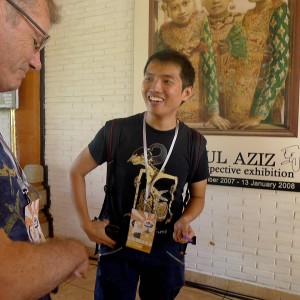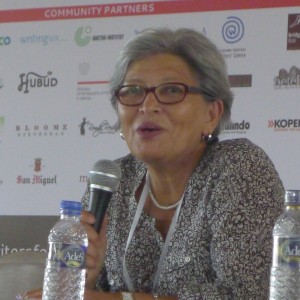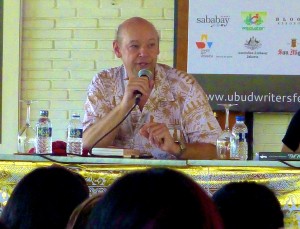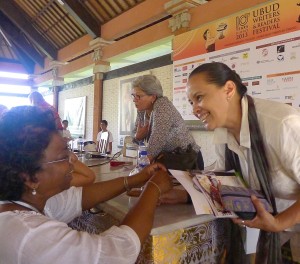At the recent Ubud Writers and Readers Festival, there was an Indonesian author who touched me deeply.
Augustinus Wibowo journeyed from Beijing to Pakistan over a 4-year period and has lived in the Middle East and Afghanistan. His most recent book “Titik Nol”, which will be translated into English next year, is a tale of visiting his dying mother and their exchange of stories – his of life on the road, hers of life at home.

Indonesian Author, Augustinus Wibowo with Tony Wheeler at Ubud Writers and Readers Festival in Ubud, Bali, Oct 2013
Wibowo describes a scene where they are standing around the hospital bed where his mother lay dying. “Christians stood on one side of the bed, reading the Bible and trying to baptize her. On the other a Buddhist priest chanted. My mother opened her eyes, laughed, and said, ‘Bring them all in.’”
“We are human with so many colors,” Wibowo said.
There was more:
“The more I travel, the slower I go,” he said. Wibowo lives with locals when he travels and avoids social media. “ If I’m checking emails from back home, I’ve disengaged from where I am. I am there to connect to the sorrows, the joy and the lives of those I am visiting.”
Wibowo said that most readers of travel books read “to feel connection.”
“Travel is learning to see from a different point of view, and ultimately travel is about discovering yourself, about coming home. We don’t have to go far to travel. Our lives are the real journey.”
This guy was singing my tune.
More gems from the festival:
Don George, editor-at-large for National Geographic Travel Magazine said that good travel writing brings about wonder, dignity, respect, appreciation – that which makes the world a better place.” He added that some of the best travel writing comes from writers who allow themselves to be vulnerable, who take risks.
Mona Prince from Egypt, an outspoken Egyptian professor who has recently been charged with insulting Islam and suspended from her job said, “In 2011 Egyptian women were full of dreams and hopes.” “Aren’t you afraid?” the moderator asked Prince. “I’m willing to pay the price, my life if necessary for our freedom,” the Egyptian novelist said.

Mona Prince, Egyptian novelist, literary translator, and activist after “Inspiring Women” at Ubud Writers and Readers Festival in Ubud, Bali, Oct 2013
Haideh Moghissi, author of seven books, from Iran, encouraged the audience to hear all voices. “So much of the western world excuses the way that Middle Eastern countries treat women by saying that it is a cultural issue. “That,” she said, “is cultural relativism”.

Haideh Moghissi speaking on “Inspiring Women” panel at Ubud Writers and Readers Festival in Ubud, Bali, Oct 2013
Amish Tripothi, from Mumbai, India, saw his first book, The Immortals of Meluha break into the top seller charts within a week of its launch.The Shiva Trilogy has become the fastest selling book series in the history of Indian publishing, with 1.7 million copies in print.
Amish said, “It took me 9 years to become an overnight success.”
Publishers did not believe there was an audience for his book. And so he and his agent published the book on their own and it sold 45,000 copies in the first 3 months. The publishers then began bidding on it. Amish refused to make the changes that the publishers requested. He said, “You can’t compromise on your book. That’s the voice of your soul.”
“The Greeks,” Amish added, “Say ‘The genius does not exist in you. Your task as a creator is to let the genius use you.’ My characters live in parallel universes and my task is to enter their worlds.”


Robin, Congratulations on an amazing festival, in a beautiful place that made a deep impression on me years ago — and my old friend Don George was there! the stars align 🙂 Glad to have you as a friend of Shebooks too! — Peggy
Thanks Peggy. Come back to Bali!
Robin
You could certainly see your skills within the work you write. The world hopes for more passionate writers like you who arent afraid to say how they believe. Always follow your heart. dedbckdacked
Thank you John!
Robin